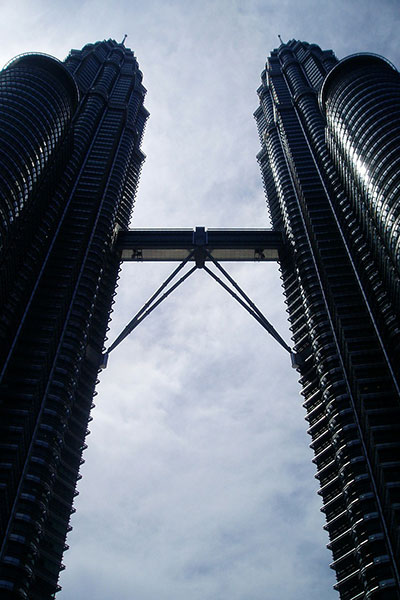Doppelgänger
In this story written in response to current events in Malaysia, a writer confronts the doppelgänger intended to silence her political speech.

Maya Chin, Malaysia’s famous reclusive author, hasn’t published anything for seven years.
She definitely did not write this article she is now holding, in today’s newspaper, although it is in her trademark snarky style. Maya’s eyes flit past columns of text and stop at her byline again. Above her name is a photograph, the one taken ten years earlier and the only one she uses for book jackets.
It’s still early. She had quickly scanned the obituary column, then the headlines, then flipping backward from the black-and-white pictures of the recently deceased, she saw it, right there, in the middle pages of the New Straits Times next to the letters to the editor: a column with her name on it and, more unmistakably, her picture.
After the Wall Street Journal report on the Malaysian prime minister transferring US$700 million of public funds, the prime minister was accusing an ex-prime minister of being behind this international mudslinging; yes, this was happening, it was the talk at the kopitiams, but it was not something that Maya wanted to publicly comment on. Certainly not while the government was blocking websites to maintain “national stability.” Her third book, which she is editing, will address corruption in Malaysia in the guise of fast-paced fiction; she doesn’t need to write newspaper articles.
Maya reads the piece quickly. The first line starts in her signature style of capitalizing the first letter of important statements: Break out the popcorn residents of Bolehland—coming to a screen too near you is Jurassic World With Malaysian Subtitles! This is followed by statements about tropical undergrowth and slithering snake varieties, and the article ends with Wall Street Journal is not the Utusan Melayu dei, Show Us The Facts!
The article is a masterpiece of double entendre and sly insinuations that look like something the New Straits Times should publish, but insidious in every line. Maya examines the craft in the opening paragraph and wishes she could write something so fork tongued. The writer uses the image of the Western media clearing Malaysian politics with a neocolonial feather duster (there is an accompanying cartoon figure), but what the words effectively do is stir up dust, then a maelstrom of dust, then let the muck resettle on the government.
It is fucking brilliant.
Could there be another Maya Chin, a younger writer she has never heard of? The picture stares back at her, a mirror of the happy woman she had been ten years ago.
Maya peers at the picture again. Could there be another Maya Chin, a younger writer she has never heard of? The picture stares back at her, a mirror of the happy woman she had been ten years ago, gazing dreamily past a mass of flowering bougainvillea as if she wrote silly romantic drivel instead of political thrillers. Maya remembers her hair had been cut to a blunt style by Terri from A Cut Above at the Bangsar Shopping Complex; she recognizes the gleam of auburn highlights in her salon-dried hair.
Preposterous! How dare some ridiculous hack writer piece together some words and then stamp the column with her face and name? Was she the only remaining rebel brand, the one to be flourished with impunity when freedom of speech was under detention in this country? Should she now expect a knock on the door, interrogations by the Special Branch at Jalan Dang Wangi . . . Oh! Maya stands up, gripping the edges of the breakfast table and letting cool, weathered marble seep into her hands.
She misses Michael. She misses his presence, his resources, how he knows everyone. Outside her window, she sees miles of sloping tea estates, the morning mist hanging low over a verdant countryside undotted by other homes. For someone who sought isolation for most of her adult life, she wasn’t prepared for this relentless solitude. She had chafed at Michael’s needs—the social gatherings, the meaningless mealtime chatter, the banality of what he was watching or reading—sometimes she wanted to conjure up a mistress to keep him company and leave her alone to unscheduled swaths of time. When he toured the world as the corporate warrior of a big multinational company, she couldn’t wait to retreat into this private writing residency they had created. Michael quoted Gibran at weddings and anniversaries, about needing spaces in their togetherness for the winds of the heavens to dance between them, but she had been completely unprepared when they took his body away.
She sold their shared semidetached house in Bangsar, and the money had sealed her complete seclusion in these hills. Her own parents were long deceased, and it was easy to turn her back on the many relatives and their sly demands of a rudderless, childless widow. For the past eight years, she has typed away on her computer for three hours in the morning and four at night on the good days, but usually much less. Her book is almost done, and this one will change Malaysia.
Lately, a lassitude fills her days and she naps often. She doesn’t answer the doorbell. She collects mail infrequently from the local post office, eyes hidden behind sunglasses, and sometimes, if she feels like it, she dresses as a Malay woman covered from head to toe in a dark and shapeless baju kurung. She grows her own vegetables and shops for spices at the weekly pasar malam, where the dim lights of the night market shield her from curious eyes. Even her literary agent, Jane (of the Quill and Scribe Literary Agency in London), functions distantly in another time zone, and Maya clings to a lifestyle with little human contact.
Now this article, out of nowhere, threatens to change everything.
Jane! She will call Jane and tell her to handle this imposter. Jane will know how to put a stop to this insolent fakery immediately (surely, literary agents handle plagiarists and fraudsters as a matter of course?). Maya picks up her cell phone and speed-dials. She feels better already.
“Hel-lo?” Jane’s voice is singing happiness. Maya hears a loud bass beat in the background and much laughter.
“This is Maya. From Malaysia.”
“Maya! Oh! I’m out with some friends, hang on a minute, I’ll step out.”
Then a breathy pause before the noise fades to a distant throb. “Everything okay, Maya?”
“No, it’s not. There’s an article in the papers today, supposedly written by me, only it wasn’t written by me.”
“Not written by you . . . or written by you?”
Maya wishes, not for the first time, her agent was less of an imbecile.
“NOT written by me. Someone ELSE wrote about the Wall Street Journal article . . . the one about Malaysian politics and embezzlement?” Maya waits for acknowledgment that Jane reads the news.
“Uh-huh.”
“Then someone put my name AND picture on the New Straits Times article. It’s in today’s paper. Check online. On the editorial page.”
“You didn’t write it?”
“Obviously not!”
Complete silence. It is only because she can hear the sudden shriek of sirens that Maya knows they haven’t been disconnected.
“Ma-ya,” Jane enunciates slowly. “We talked about this article two days ago. It’s brilliant! Remember, you sent me the copy to look over? On email?”
“What?”
“Then I sent it to the New Straits Times and also to the Guardian.”
“I haven’t sent an email for weeks!”
Was that a sigh? “Maya, you did. You called me first, we discussed the article, then you sent the file on gmail. I absolutely looooved what you did! Then I called you and we talked about the fallout from this article, but the publicity will be great for the book coming out in two months!”
“What are you talking about? What book?”
This time, there is no mistaking the sharp intake of breath. “Look, Maya, let me call you back. My friend, it’s her birthday, and we . . . it’s past midnight and I should get back to the party. I’ll call . . . um . . . in exactly twelve hours, ok?”
“No!” Maya hears herself shouting. “No, it’s not ok! I haven’t sent you anything, I haven’t spoken to you in months, and I don’t have an effing gmail account! What are you talking about?”
“Maya. Please. There’s been, some, some fu . . . misunderstanding . . . I don’t know. We have been talking every two weeks for the past three months, and I think the book is really BIG, I can’t even . . .”
Maya hangs up. She thinks, This isn’t real. I will wake up and there will be no newspaper, no telephone.
But the rays of the morning sun are already striping the newsprint of her morning paper. A crow flies over the hibiscus blooms and caws loudly. Maya sees the black shadow of the bird and she understands, as if in rebuke, that there is no person in the world she can turn to now, no one at all to assure her she is not going mad. She feels untethered, with portents of doom at every turn.
Why had she not seen this coming six years ago, when she made herself as invisible as deliberately as if putting on a magic cloak? When the memoir on losing Michael and hearing his footfalls everywhere became an instant best-seller, it had been unbearable to speak about the book, about Michael Who Was No More. Despite the invitations from international literary festivals as far away as Bhutan and Portugal, despite the letters that her agent forwarded from bereaved readers all over the world, she shrank at the idea of peddling her grief. The prize nominations continued to pour in from all over Europe, making Jane and the agency very happy, especially as her first two books (both political thrillers banned in Malaysia then peddled as pirated copies) had been critically acclaimed but sold mainly library copies. Jane had tried to coerce Maya into giving interviews, but even those emailed questions were vetted through the Quill and Scribe agency, with the questions answered by interns.
Maya punches the keys of her MacBook savagely, scanning for any evidence of having sent emails, edits—a whole fucking manuscript!—without remembering. She is terrorized by the thought of dementia, of memory loss without any warning.
But there is nothing. Her Yahoo account is bare, except for two emails: a “My Dearest” missive asking for money and “One simple trick” peddling weight loss. She feels vindicated, but hot rage makes her google herself, something she has resisted for years, and she sets the parameters to display results from the last week.
The numbers stack up swiftly: 4,009 hits listing Goodreads pages, websites, and discussions on Maya Chin. The first entry says, Maya Chin to appear at Cooler Lumpur Literary Festival . . . limited seating available!!! The date on which Maya Chin is to appear is today.
Maya clasps her hands together to stop the trembling. Then she clicks on the top link, which takes her to a Facebook page abuzz with the news of reclusive Maya Chin finally giving a talk. There are no author pictures, but the covers of her novels and her memoir form a jaunty marquee. Someone posted the New Straits Times article, and she notes 287 likes, followed by 59 comments. She begins to read:
—hahahaha writer piss of grand proportions
—Ai Yah! Her uncle is one of the dogs from MCA! Your have money but not righteous and wisdom! !!!!
—Maya Chin you wan Malaysia to be the next Greece? Yup. Complain complain complain aje and no solutions
—God is always for the Good. God keeping cards close to chest. HE will strike when the time is right. The EVIL, FASCIST regime will be destroyed. The clock is ticking.
—can’t flatten the crumpled paper isn’t it
—MoFo Your ENTIRE CLAN SHALL ETERNALLY BE PLAGUED WITH UNTOLD PAIN DISEASE AND CEASELESS SUFFERING That EVEN DEATH, will ONLY INTENSIFY AND DEEPEN IT
—Like Jesus, ya? Whack her when alive, erect monuments after she’s dead you fuckin retards
—Shit just got real. We are all Maya Chin.
—Erk. Third world country? Sigh
—Hey Maya Chin, wat u hate most ah, the Malays or the Malay language you assswipe
—You’re an excellent writer and I seek out your column to read whenever I find out it’s in a publication. Don't let the haters get to you, just shake it off!! Hilarious and fabulous!
—I remember seeing her columns elsewhere. She wasn't that funny then either.
—so sorry and annoyed im missing your talk . . . just cant make it down, because work and family . . . with you in spirit Maya! hugs and congrats!
—God dammit! Now it makes me question everything. Not really.
—Who The Fuck Capitalizes Every Word? kill mi everitim
It goes on, this illiterate drivel of those who curse better than they write sentences, the diatribes from godly people bent on saving her soul and the nationalists waging war against her Islamophobia. She imagines fans printing out her picture from the web now, just so the legendary Maya Chin can sign that without them having to read a single word she has written. Maya looks out of the window at the expanse of uninhabited green: this too is real.
The only thing to do is to take the car out and meet this nemesis. Maya has never run from a challenge and has taken on powerful politicians in her writing, but she hates to drive, especially into the city. But there is no other way if she is to unmask this literary fraud publicly. A stray thought makes her log into her bank accounts; if this fraudster has got through to Jane and the Quill and Scribe agency, she needs to check that her money is still safe. She checks one account, then another, and another . . . her money is all there.
She closes her eyes and exhales deeply as she starts playing the scene in her mind. A stage with the moderator and the imposter, and between them a table with books artfully arranged around purple orchids . . . then the real Maya Chin sweeps in, disruptive but firm. Maya opens the next link from the search, which has a recent interview—“An Exclusive with Reclusive Maya Chin!”—but that article, too, has no pictures of the charlatan. Maya reads with growing horror that her new novel is titled On Congenial Soil and is a memoir of growing up Malaysian, warts and all.
She slides out of her chair and puts the kettle on. If that idiot Jane is drinking herself into a hangover right now, she’ll be even more useless in another twelve hours. On Congenial Soil sounds like a mindless romp, a far cry from the political books she actually writes. Her series is set in a mystical Hirplelaya, where all the citizens are deformed at birth and limp very slowly. She does not name Malaysia in her books, but the scandals of the government are recognizable, as are the excesses of the First Lady whose designer handbags cost more than an average annual salary. She checks on the third book of the Hirplelaya, which is saved on her computer and securely backed up on iCloud.
Maya stirs sugar into her tea. The imposter will be speaking at the Cooler Lumpur Literary Festival at 3 p.m., which gives her just enough time to drive to Kuala Lumpur. She chooses her outfit with deliberation: muted long gray dress with a light black jacket for the air-conditioning, a paisley scarf in black to cover her hair, and flat shoes for driving. She picks out the largest pair of oversized dark glasses.
On her way out, she takes one of her novels. The website says that Maya Chin will be signing books.
*********
As Maya passes through the decorated archway dividing Petaling Jaya from Kuala Lumpur, she unclutches her fingers from the steering wheel to release the tension in her arms, then quickly glances at the mirrors, ready for the precision steering required to get out of the way of cars hurtling too close. The motorists have a complete disregard for public safety, but she is almost at her destination.
Her heart beats a tightly wound thrum, ready for battle. She wants no flashlights or microphones thrust at her face, so she needs to be precise and quick. She practices saying, “I am the REAL Maya Chin.” In two hours, perhaps less, she expects to be driving home again.
When the familiar blue of the Central Market looms ahead, she is filled with nostalgia. In the early years of their marriage, before Malaysia had Cold Storage and Giant, this was where she and Michael shopped for live fish swimming in tanks. The smell of rambutans, mangosteens, and mata kuching, the pungent ripe guavas fresh from orchards, had perfumed the air. She remembers the give and take of bargaining, her newly wedded sheen forcing the shopkeepers’ indulgence.
Now the building pulses with shoppers, but the stalls are lined with glittering souvenirs. Maya walks past rows of pewter Twin Towers and batik fans. The aroma of food from the restaurants on the first floor—nasi ayam, laksa, roti telur—remind her that she had no lunch today. Maya hurries past shops to the Annexe Building and comes to a standstill in front of her own picture on a poster.
This picture is identical to the one in the newspaper, but enlarged. Maya nervously ducks her head as a group of college students swish past her. A couple with fingers entwined strolls past, then the boy tugs the girl back and they stop next to Maya. Maya holds her breath. The boy examines the poster for the details of the talk then, with a swift glance at his watch, leads the girl away.
Maya feels in her purse for her book and walks through the open door behind the couple.
A young man is at the mike, speaking in English with some Malay phrases garnishing his speech. He says the author wishes to sign books in advance of the talk so that fans can refer to the passages she will read. There is applause from the young audience; some hoot in appreciation. Maya scouts the large room for a table with her books stacked in neat rows. She knows, from experience, the author will be seated nearby.
She feels the presence of the woman before she sees her. Maya turns slightly to see a woman sitting behind a table, pen poised in her hand. The woman is talking to a young man, but she is looking at Maya.
She is not a superstitious person, doesn’t believe in the paranormal, but she knows this sensation from before: from the day the phone had rung incessantly in the hot afternoon and she felt she could not move fast enough to pick it up, that she should not pick it up because it would change her life forever, and she was told that Michael was gone.
Maya has the sensation of walking through wet sand, the ground beneath her feet sucking at her shoes, forcing her into a slow limp. She is not a superstitious person, doesn’t believe in the paranormal, but she knows this sensation from before: from the day the phone had rung incessantly in the hot afternoon and she felt she could not move fast enough to pick it up, that she should not pick it up because it would change her life forever, and she was told that Michael was gone.
She wonders whether to sit down. But the line of people with books is growing long and she worries she will miss this chance. Maya forces herself forward, all the way to the front, and the young, grumbling, give way because she is resolute.
The imposter continues to sign books, making small talk about a girl’s name, then about the pretty earrings of another. When Maya slides her book across the divide, the woman looks up and smiles. She signs. Maya watches her own signature rendered authentic in someone else’s hand, the two dots below the Chin as perfect in execution as the swirl at the bottom of the y. The woman dates the signature. Maya extends her hand, intending to snatch her book back, but the woman puts her hand over Maya’s and laughs, “Not so quick! You must tell me your name so I can write something just for you.”
Maya feels heat burning where her hand should be. She is hypnotized by the eyes. She hears the impatience of people behind her, willing her to say something. Slowly, deliberately, Maya takes off her dark glasses.
“I am the REAL Maya Chin,” she says.
A titter sounds behind her, followed by giggles. Some jackass says, “I am the REAL Salman Rushdie,” and his friend mimes, shooting him between the eyes with a finger gun. Everyone laughs, including the imposter.
A young man with a purple snake tattooed on his wrist points to a poster behind the imposter. “Aiyoh, Auntie, can see the picture or not? Maya Chin not so old lah.”
Maya sees it. The resemblance between the enlarged picture and the woman sitting below it is not exact, but she sees the same auburn highlights in the woman’s hair, the unwrinkled forehead and glossy lips. The woman’s dress is in a pink fuchsia of the exact shade of the bougainvillea in the photograph, and she is probably a few years younger than Maya was when the picture was taken. The imposter’s jawline is wider, her eyes smaller, but these details are immaterial. Maya, in her long gray mourning dress, looks nothing like the woman or the photograph.
The woman has Maya’s book open as she glares at the tattooed boy. “No need to be so rude!” she says sharply, “Can what, two people have same name! Come, I will sign it To Maya Chin, from Maya Chin.”
And with a flourish she does exactly that. She inserts a happy face and writes, P.S.: Happy Reading, Namesake!
The man at the microphone hurries to the table. He takes Maya’s book with one hand and steers Maya with his other hand on her back. She feels hustled to a seat nearby as two men take the seats on either side. She accepts the book handed to her.
The two men settle into their chairs. As one slouches down and wriggles his feet under the seat in front, Maya looks at him again. She forgets names, but never faces. Nine years ago, at a protest rally (the sort of thing Maya used to attend regularly), this man had been dressed in a red “Patriot” shirt. He had been one of the thugs threatening to beat up the ones dressed in yellow T-shirts, people like her rallying for a clean and transparent government.
She hears the conversation on the stage indistinctly as she plans her next move. There is talk about building one Malaysia for all races. When the Wall Street Journal article is mentioned, the imposter is outraged at Western media sources targeting legitimate Asian governments. Then the imposter begins to read from Maya’s book, choosing a passage on unexpressed love within a dysfunctional family. Maya turns automatically to that page, past all the details of political excesses preceding that particular section.
That Maya has set up her own jail—her seclusion, her refusal to update her photograph, her unwillingness to give interviews—has saved her nemesis much trouble.
She watches the Maya Chin on stage rebranding Hirplelaya. As the voice drones on, articulating too-familiar words, Maya knows she was smoked out of her lair to hear her own words recontextualized. That Maya has set up her own jail—her seclusion, her refusal to update her photograph, her unwillingness to give interviews—has saved her nemesis much trouble.
Maya struggles to her feet. The imposter pauses to glance in her direction, then smiles, raising her right hand in a gentle wave as she continues to speak. The two men at Maya’s side rise to lead her out the door and into a small office where the only sound is that of the air-conditioner. There are no windows.
One of them extracts a bottle of water from the small fridge.
“Minum?” he asks.
Maya does not look at the men. She studies the newspaper on the table; it is a financial daily with a black front page. It claims, in red writing, that Malaysia has been cheated out of US$1.83B. There is a note from the publisher at the bottom: After this report, which could be our last, we will hand over everything we have to the authorities investigating 1MDB and assist in any way we can.
The walls are sea-blue, freshly painted. She wonders how long she will be here.
The man who was at the microphone walks in and nods at the two men.
“Am I being detained?”
The man laughs easily. “Of course not! You’re free to go, anytime.” He looks at her. “We don’t want trouble at the Litfest, that’s all. Maya Chin is an important writer and people want to hear what she has to say.”
“I am going to the police with this. Don’t even think you’ll get away with this.”
The man sits down across the table. “Hmm. And what do you think the police will do? What are you going to report?”
“You know bloody well . . . I have my MyKad, my fingerprints can be verified against records . . .”
“The biometrics for the author Maya Chin will not match yours in the government records.”
“I don’t believe this!”
“Are you recording our conversation? Go ahead, go to your friends in the media, see if that will work.”
She stabs at the newspaper. “Yes, see how the media is working, yah?’
He scans the text she points to. “After this report, which could be our last? Don’t imagine things lah they are reporting on the 1MDB scandal for the last time, after that it’s under official investigation. That’s all. No one is shutting anything down.”
He breaks the cap of the bottled water with a twist and slides it across to her. She takes a long sip. “Malaysia is not Singapore. No need to lock up writers, or send bloggers to the madhouse, or even bankrupt anyone, eh? So unnecessary, all this calling international attention to our internal affairs.” He stands up. “Come, you are free to go.”
Maya does not get up.
“Travel a bit, see Korea, Japan, countries you haven’t seen.” He slides his business card across. “Call me if you need help. This could be the beginning of good things.”
“I can’t publish anything ever again.”
He doesn’t smile. “On Congenial Soil will be out in a few months.”
Maya thinks that a real doppelgänger, a wraith conjured up by a bomoh in Borneo to silence her with magic, would have been preferable to an end this prosaic.
Maya thinks that a real doppelgänger, a wraith conjured up by a bomoh in Borneo to silence her with magic, would have been preferable to an end this prosaic. The beginning of good things. She thinks of a lifetime of servitude to the word, months of writing resulting in the rejection from editors. How much of her life has she wasted in trying to coax unwilling sentences out of nothing? Perhaps this imposter is doing her a favor, setting her free to be among the living again, free of the dictates of unwritten books, of needing to touch people she may never meet.
But oh, what will she do with those ideas that drive her out of a shower, hair half-washed? The hum of a finely wrought sentence playing in her mind? The deep meditation of writing throughout the night?
She sees her empty house, the silence shattered by the cawing of crows, of nights merging into mornings without rapture, without an end. Maya stands up. For the first time in her life, she understands the heft of words, of bereft.
Chicago, Illinois
[You can read a Portuguese translation of this story hosted on the University of Sao Paulo - Modern Letters department website.]
Editorial Note: This story will appear in her forthcoming collection, Rules of Desire (Fixi, 2015).













